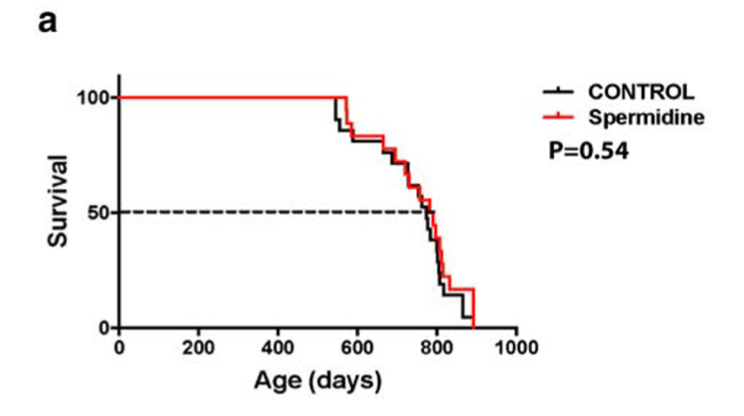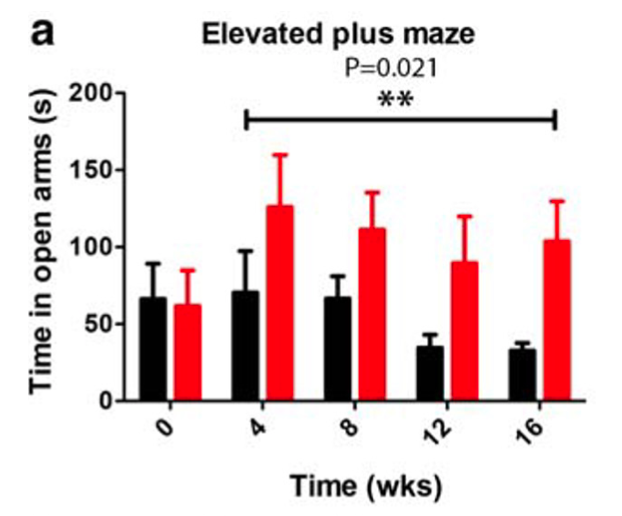Highlights
- Long-term spermidine treatment does not extend lifespan in rats.
- Spermidine improves anxiety and inflammation in aged rats.
- Cell recycling processes (autophagy) are activated with spermidine treatment.
In the early 2000s, scientists coined the term inflammaging to describe the close relationship between low-grade chronic inflammation and aging. Inflammaging has been linked to a broad spectrum of age-related disorders in various organs, particularly the brain.
Popa-Wagner and colleagues show in GeroScience that the anti-inflammaging compound spermidine increases the healthspan of middle-aged rats as seen by reductions in anxiety and neuroinflammation. Additionally, the researchers found that long-term treatment with spermidine promotes the removal and recycling of damaged cellular components (autophagy) in the brain, increasing anti-oxidant effects and decreasing neuroinflammation. However, spermidine treatment did not extend the median and maximum lifespan of the tested rats. The findings highlight the potential of utilizing long-term spermidine supplementation to extend healthspan – the years lived in good health – by targeting neuroinflammation-induced neurological conditions.
What Do We Know About Spermidine?
Spermidine has been on the radar for researchers interested in aging and longevity. In addition to increasing the median lifespan of mice and worms, spermidine has protective effects on the heart and a beneficial impact on age-associated diseases like cancer and neurodegeneration in some animals. So, there is ample evidence that spermidine has anti-inflammatory properties, suggesting that it may benefit healthspan.
Spermidine does not extend lifespan
Popa-Wagner and colleagues began spermidine treatment of year-and-a-half-old rats for nearly one year (350 days). While spermidine-fed animals (25 mg/kg/day) displayed increased serum spermidine levels (7.8 nmol/ml serum) as compared to controls (3.9 nmol/ml serum), the maximal survival was of 773 days for controls and 784 days for the treatment group. Neither the maximum nor the median life was significantly different between treatment and controls.

Spermidine Lowers Anxiety
While spermidine did not affect rat lifespan, Popa-Wagner and colleagues wanted to get a better sense of the treatment’s effects on brain inflammation and aging. To evaluate the effects of spermidine on the brain, the researchers tested several aspects of cognition and behavior, including anxiety, memory, and motor coordination. Using a battery of tests, Popa-Wagner and colleagues showed that spermidine did not affect memory or motor coordination in aged rats.
But spermidine did affect anxiety. To evaluate anxious behavior, Popa-Wagner and colleagues employed the “Elevated Plus Maze” test. Here, rats are placed at the center junction of an elevated, plus-shaped (+) apparatus exhibiting two open arms and two enclosed arms. The thinking here is that rats with increased anxiety will prefer exploring enclosed arms, as those locations prevent the rats from falling off the maze. In contrast, rats with reduced anxiety allocate more time in the maze’s open arms that lack protection. Following 16 weeks of observations, the research team found that rats orally supplemented with spermidine displayed significantly less anxiety behavior than control rats, who, as expected, spent drastically less time in the maze’s open arms.

Spermidine has an anti-inflammatory effect
Next, Popa-Wagner and colleagues looked at markers of inflammation in several organs following spermidine supplementation. The researchers found that spermidine significantly reduced proinflammatory markers in the brain and in several other organs, including the heart, liver, kidney, and spleen. In association with these anti-inflammatory effects, the researchers found t elevated levels of autophagic markers. Since autophagy has been shown to eliminate compounds that induce oxidative stress (reactive oxygen species), these findings support the proposition that spermidine contributes to prolonging healthspan by reducing neuroinflammation without affecting rats’ median and maximum lifespan.
Healthspan Over Lifespan
The results that spermidine improves healthspan in rats is not entirely surprising, as spermidine has been shown to have protective effects on several organs in mice. What is important to note is that spermidine has shown benefits to lifespan in other animals. For example, various studies show that oral supplementation of spermidine extends the median lifespan of mice.
Nevertheless, prolonging one’s healthspan arguably should take precedence over extending one’s lifespan; those added years mean nothing if they’re filled with sickness and disease. Also, given what we know about anxiety, a significant influence on neurodegeneration and heart disease in aged people, this research is significant, as it points to the possibility of using spermidine to increase human healthspan. Since stress and anxiety, which are detrimental to life in their own way, lay the groundwork for decreased healthspan and lifespan, it’s worth considering supplementation strategies that precede neurodegeneration and heart disease.
“Living a longer, healthier life brings benefits to individuals, employers, and wider society that will be increasingly valuable in an aging population,” concluded researchers.